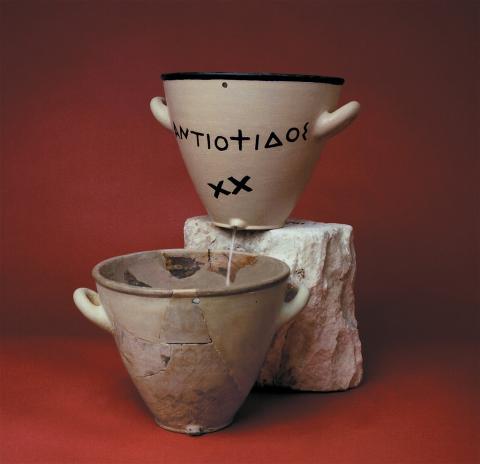Narrative portion (διήγησις) of the speech, 18–84. It is unusually long for a διήγησις, but this digressiveness is characteristic of Apollodoros’ style.
Neaira was one of seven girls purchased and raised to be prostitutes by Nikarete, a freedwoman from Elis. She passed them off as her freeborn daughters, but then sold them when their earning days were over.
18
ἑπτά . . . ταύτας παιδίσκας: no article is needed with the demonstrative when definite numbers are used (S. 1178).
ἐκτήσατο “purchased” as slaves.
Ἠλείου: of Elis, a region in the Peloponnese.
δεινή . . . συνιδεῖν: δεινός + infinitive = “clever", "skilled at [doing something]”.
καὶ δυναμένη: Dilts 2009, following Auger, brackets this as an explanatory gloss.
εὐπρεπῆ: modifies the preceding φύσιν; for 3rd declension adjectives of the -ης, -ες type, see S. 292.
συνιδεῖν < συνοράω (aor. συνεῖδον), “to discern with a keen eye” (Kapparis 1999: 208).
καὶ ταῦτα: a common way of amplifying what’s come before; translate as “what’s more” or “in addition.”
τέχνην ταύτην κατεσκευασμένη “making this her profession” (LSJ κατασκευάζω A.3).
ἀπὸ τούτων: the demonstrative pronoun here is neuter.
βίον “livelihood”.
συνειλεγμένη < συλλέγω, “get", "earn”.
19
προσειποῦσα < προσεῖπον (used as second aorist of προσαγορεύω).
πράττοιτο: in its middle sense “obtain", "exact [money]” + double accusative (person and thing) (LSJ πράσσω VI).
πλησιάζειν: with a sexual sense, “to consort with”.
ἡλικίαν: Kapparis 1999 translates this as “flourishing youth” (214) or “prime youth” (215).
συλλήβδην: i.e., all of them (but not all at the same time).
σώματα: the word σῶμα is often used as a synonym for “slave,” since slaves were conceptualized as (mere) bodies. Here, however, the word σώματα is better taken as “bodies.”
ἀπέδοτο: “sold” (LSJ ἀποδίδωμι III).
Ἄντειαν καί . . . Νέαιραν: some of these prostitutes are mentioned in book 13 of Athenaeus’ Deipnosophistai; see Kapparis 1999: 208–9 for more detail.
20
ἣν μέν . . . καὶ ὡς “which one . . . and how,” introducing indirect questions after δηλώσω below.
ἂν βούλησθε . . . ᾖ: ἄν = ἐάν.
ὕδατος: that is, the water in the κλεψύδρα (water clock, see the excavated example from the Athenian Agora), used to measure time in court.
ἐπανελθεῖν < ἐπανέρχομαι, in speaking or writing, “to return to [a point]”.

